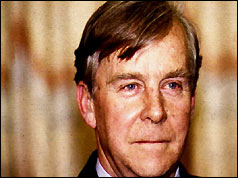Richard Scott
( Jurist, Lawyer) | |
|---|---|
 | |
| Born | Richard Rashleigh Folliott Scott 1934-10-02 |
| Alma mater | • University of Cape Town • Trinity College (Cambridge) |
| Spouse | Rima Elisa Ripoll |
Sir Richard Scott conducted a three-year judicial inquiry (Scott Inquiry) into the sale of arms to Iraq during the 1980s. The Scott Report was published on 15 February 1996 and singled out two Tory ministers for criticism: Attorney General Sir Nicholas Lyell and Treasury Chief Secretary William Waldegrave.
The report concluded government policy towards the export of non-lethal military goods was changed after the 1988 ceasefire in the Iran-Iraq war in a way that should have been reported to the Commons.
Following publication of the report the then Shadow Foreign Secretary Robin Cook called for implementation of the inquiry's recommendations in full. However, since coming to power in May 1997, Tony Blair's Labour government failed to introduce the changes advised by the Scott report.[1]
Early life
The son of Lieutenant-Colonel C. W. F. and Katharine Scott, Scott was born on 2 October 1934 and educated at Michaelhouse School, Natal in South Africa.[2] He then studied at the University of Cape Town, where he graduated with a Bachelor of Arts degree in 1954, and Trinity College (Cambridge), where he received a BA (Law Tripos) in 1957 and a Blue in rugby.
In 1958, he spent a year as Bigelow Fellow at the University of Chicago, where he met his future wife, Rima Elisa Ripoll, who is from Panama.
Legal career
Scott was called to the bar by the Inner Temple in 1959, becoming a Bencher in 1981. From 1960 to 1983, he practised at the Chancery Bar, and was appointed a Queen's Counsel in 1975. In 1980, Scott was appointed Attorney-General of the Duchy of Lancaster, a post he held until 1983. He was Vice-Chairman of the Bar from 1981 to 1982, and chairman from 1982 to 1983.
Scott was appointed a Judge of the High Court of Justice in 1983, sitting in the Chancery Division, and received the customary knighthood.[3] From 1987 to 1991, he held the office of Vice-Chancellor of the County Palatine of Lancaster,[4] which has responsibility for overseeing Chancery business in the North of England. He was promoted to the Court of Appeal in 1991, becoming a Lord Justice of Appeal and receiving an appointment to the Privy Council, and serving as Vice-Chancellor, the head of the Chancery Division, from 1994 to 2000, and Head of Civil Justice from 1995 to 2000. In 2003, he was appointed a non-permanent member of Hong Kong's Court of Final Appeal.[5]
On 17 July 2000, he was appointed a Lord of Appeal in Ordinary and created a life peer as Baron Scott of Foscote in the County of Buckinghamshire.[6] He retired from this post on 30 September 2009, and did not transfer along with the other Lords of Appeal of ordinary to the new Supreme Court of the United Kingdom. The vacancy on the bench his retirement created was filled by Lord Clarke of Stone-cum-Ebony, previously Master of the Rolls.[7]
Scott Inquiry report
- Full article: Scott Report
- Full article: Scott Report
Under Margaret Thatcher, arms were supplied illegally and secretly to both Iraq and Iran, in contravention of UN resolutions and British law in what has become known as the Arms-to-Iraq affair. Billions of pounds worth of arms were exported and British ministers, officials and businessmen made fortunes from the illicit trade before it was discovered and swiftly closed down. The British cabinet set up a secret sub-committee to oversee the operation, with both the Home Office (MI5) and the FCO (MI6) ordered to support the illegal exports.
Michael Heseltine, Geoffrey Howe, Willie Whitelaw, Francis Pym and PM Thatcher all gave the secret project government blessing. During the 1992 Matrix Churchill trial ex-Minister Alan Clark let the cat out of the bag revealing that ‘the interests of the West were best served by Iran and Iraq fighting each other, and the longer the better.’[8]
Sir Richard Scott conducted a lengthy inquiry into allegations focused on a government-led conspiracy to prejudice the outcome of a criminal prosecution against Matrix Churchill – a small Iraqi owned, British based and managed armaments manufacturer. Scott was also required to investigate serious charges that the government had repeatedly “misled” Parliament, lied to the public and undermined the 300-year-old constitution.
By any reading, Scott's inquiry report upheld all three allegations; adding a few of his own for good measure. Once sufficient to bring any accountable government tumbling to its scabbed knees, the carefully worded report was subjected to acrimonious debate in Parliament. Bruised, battered and reeling under incessant Parliamentary and media assault, John Major's government scraped a technical victory and by the slimmest of partisan votes - 320 against 319 - survived to export another day. Twenty four hours later, the whole affair - arguably the biggest political scandal in decades - disappeared as though tossed off the edge of the planet, stark testimony to the integrity of British journalism. [9] If nothing else this inspiring media event confirmed Dr Samuel Johnson’s favourite 16th century homily:
- "Thank God you cannot bribe or twist, the honest English journalist, for seeing what he will do, for free, there is no occasion to.”
Disgruntled with the government's “management” of his exhaustive inquiry, Richard Scott hit back during a lecture delivered at the University of Essex on 19 March 1996. Criticising excessive governmental secrecy he said that the British system of governance was an “elective dicatotship.”
References
- ↑ "1996: Arms-to-Iraq report published"
- ↑ http://www.ukwhoswho.com/view/article/oupww/whoswho/U34106
- ↑ London Gazette |issue=49665 |date=6 March 1984 |startpage=3253
- ↑ http://www.debretts.com/people/biographies/browse/s/3243/Richard+Rashleigh.aspx |
- ↑ http://www.info.gov.hk/gia/general/200305/02/0502180.htm
- ↑ London Gazette |issue=55920 |date=21 July 2000 |startpage=8034
- ↑ http://webarchive.nationalarchives.gov.uk/20090723174303/http://www.number10.gov.uk/Page19036
- ↑ Document:Maggie's Guilty Secret by John Hughes-Wilson
- ↑ Document:In Defence of the Indefensible by David Guyatt